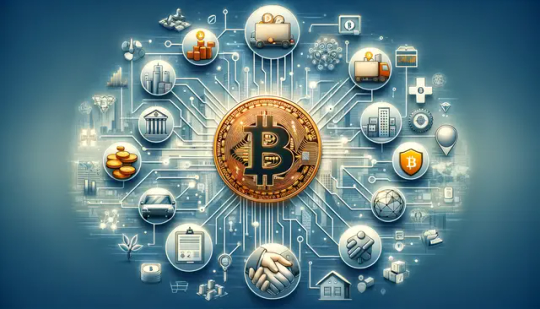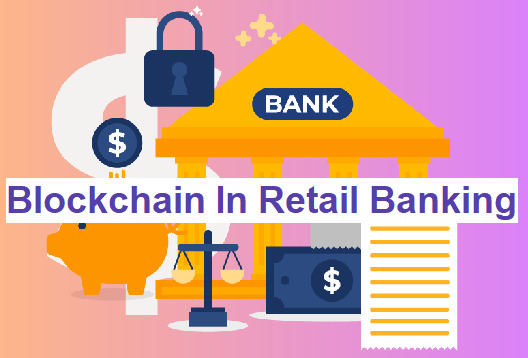#blockchainadoption
Explore tagged Tumblr posts
Text
Unlocking the Power of Blockchain Technology

Blockchain technology has been making waves in the tech industry, and its potential extends far beyond cryptocurrency. At its core, blockchain is a decentralized, secure, and transparent way to store and transfer data.
Key Benefits:
Security: Blockchain's cryptographic algorithms ensure tamper-proof transactions.
Transparency: All transactions are publicly visible, promoting accountability.
Efficiency: Automated processes reduce processing time and costs.
Real-World Applications:
Supply Chain Management: Tracking goods and materials with precision.
Smart Contracts: Self-executing contracts with predefined rules.
Identity Verification: Secure digital identities for individuals.
Future Outlook:
As blockchain technology continues to evolve, we can expect:
Mainstream Adoption: Integration into various industries.
Innovative Solutions: New use cases and applications.
Increased Security: Enhanced protection against cyber threats.
Conclusion:
Blockchain technology is transforming the way we think about data, security, and efficiency. Stay tuned for more insights into the world of tech crypto!
2 notes
·
View notes
Text
Understanding Blockchain Technology: Beyond Bitcoin

Introduction
Blockchain technology, often synonymous with Bitcoin, is a revolutionary system that has far-reaching implications beyond its initial use in cryptocurrency. While Bitcoin introduced the world to the concept of a decentralized ledger, blockchain's potential extends well beyond digital currencies. This article explores the fundamentals of blockchain technology and delves into its various applications across different industries.
What is Blockchain Technology?
At its core, blockchain is a decentralized, distributed ledger that records transactions across many computers in such a way that the registered transactions cannot be altered retroactively. This ensures transparency and security. Each block in the chain contains a list of transactions, and once a block is completed, it is added to the chain in a linear, chronological order.
Key features of blockchain include:
Transparency: All participants in the network can see the transactions recorded on the blockchain.
Immutability: Once data is recorded on the blockchain, it cannot be altered or deleted.
Security: Transactions are encrypted, and the decentralized nature of blockchain makes it highly secure against hacks and fraud.
Blockchain Beyond Bitcoin
While Bitcoin brought blockchain into the spotlight, other cryptocurrencies like Ethereum and Ripple have expanded its use cases. Ethereum, for example, introduced the concept of smart contracts—self-executing contracts where the terms are directly written into code. These smart contracts enable decentralized applications (DApps) that operate without the need for a central authority.
Applications of Blockchain Technology
Finance:
Decentralized Finance (DeFi): DeFi platforms leverage blockchain to create financial products and services that are open, permissionless, and transparent. These include lending, borrowing, and trading without intermediaries.
Cross-border Payments: Blockchain simplifies and speeds up cross-border transactions while reducing costs and increasing security.
Fraud Reduction: The transparency and immutability of blockchain make it harder for fraud to occur, as all transactions are visible and verifiable.
Supply Chain Management:
Tracking and Transparency: Blockchain provides end-to-end visibility of the supply chain, ensuring that all parties can track the movement and origin of goods.
Reducing Fraud: By recording every transaction, blockchain helps prevent fraud and counterfeiting, ensuring the authenticity of products.
Healthcare:
Secure Data Sharing: Blockchain allows for secure sharing of patient data between healthcare providers while maintaining privacy and consent.
Drug Traceability: Blockchain helps track pharmaceuticals through the supply chain, reducing the risk of counterfeit drugs.
Voting Systems:
Secure Elections: Blockchain can provide a transparent and tamper-proof system for voting, ensuring that each vote is recorded and counted accurately.
Increasing Voter Participation: The security and convenience of blockchain-based voting could lead to higher voter turnout and greater confidence in electoral systems.
Real Estate:
Property Transactions: Blockchain can streamline property transactions by reducing paperwork, ensuring transparency, and preventing fraud.
Record-Keeping: Immutable records of property ownership and transactions enhance security and trust in the real estate market.
Challenges and Limitations
Despite its potential, blockchain technology faces several challenges:
Scalability: The ability of blockchain networks to handle a large number of transactions per second is limited, impacting its adoption in high-volume industries.
Energy Consumption: Blockchain, particularly proof-of-work systems like Bitcoin, requires significant energy, raising concerns about its environmental impact.
Regulatory Challenges: The decentralized and borderless nature of blockchain poses regulatory and legal challenges, as governments and institutions seek to manage and control its use.
The Future of Blockchain Technology
The future of blockchain looks promising, with continuous advancements and innovations. Potential developments include improved scalability solutions like sharding and proof-of-stake consensus mechanisms, which aim to reduce energy consumption and increase transaction speeds. As blockchain technology matures, its adoption across various industries is expected to grow, potentially transforming the way we conduct business, manage data, and interact with digital systems.
Conclusion
Blockchain technology, initially popularized by Bitcoin, holds immense potential beyond cryptocurrencies. Its applications in finance, supply chain management, healthcare, voting, and real estate demonstrate its versatility and transformative power. While challenges remain, ongoing innovations and growing interest in blockchain suggest a future where this technology plays a crucial role in various aspects of our lives.
#blockchain#Bitcoin#blockchaintechnology#cryptocurrency#decentralizedfinance#DeFi#supplychain#healthcare#votingsystems#realestate#blockchainapplications#smartcontracts#DApps#digitalledger#blockchainsecurity#blockchainfuture#blockchainadoption#techinnovation#financial education#financial empowerment#financial experts#finance#digitalcurrency#unplugged financial#globaleconomy
4 notes
·
View notes
Text

🚀 Crypto Isn’t a Scam—It’s the Future! 💡
❌ MYTH: Crypto is fake & risky ✅ FACT: Major banks, governments & industries are investing!
🔹 Transforming global finance 🌍 🔹 Bitcoin is legal in many countries ✅ 🔹 Banks are adopting blockchain 🏦 🔹 DeFi removes middlemen 🔗
Still doubting? The world is moving forward—don’t get left behind! 🌐 www.decryptox.com
0 notes
Text
Tether Acquires Minority Stake in Juventus to Drive Blockchain Adoption in Sports

Tether's Investment in Juventus Marks a Milestone in Blockchain Adoption for Sports. In a significant move to integrate blockchain technology into mainstream industries, Tether has acquired a minority stake in the renowned Italian football club Juventus. This acquisition is a strategic step toward accelerating blockchain adoption in the sports sector, aiming to bring the power of digital currencies and decentralized technologies into the world of professional sports.

Tether, well-known for its stablecoin USDT, has long been a cryptocurrency market leader. Tether's purchase of a share in Juventus, one of Europe's most iconic football clubs, demonstrates the company's strong commitment to bridging the gap between blockchain technology and sports. The alliance intends to investigate a variety of new solutions based on blockchain technology, including fan engagement, ticketing, and product sales. Also Read: ethereum-price-set-to-skyrocket-with-staked-eth-etfs-a-potential-10k-surge Blockchain adoption in sports has progressively increased over the years. Teams and organisations are increasingly turning to blockchain technology to build more transparent, safe, and efficient systems for managing everything from player contracts to ticket sales. However, the collaboration between Tether and Juventus represents one of the most significant advancements in this path. The potential advantages of blockchain technology in sports are numerous. Fans may soon be able to engage with their favourite teams in new and exciting ways, utilising blockchain-based platforms to buy unique fan tokens, vote on club decisions, and even trade memorabilia in a secure, transparent environment. Blockchain's capacity to verify legitimacy and ownership will transform how sports fans interact with their teams, making the experience more immersive and rewarding. Furthermore, the integration of blockchain could result in major increases in transparency, particularly in areas such as ticketing. Currently, the sports ticketing sector is plagued by fraud and scalping. Blockchain could solve these issues by generating a tamper-proof digital record of each ticket, ensuring that fans only pay the correct amount and lowering the possibility of counterfeit tickets. This acquisition may also allow Juventus to venture into the area of decentralised finance (DeFi), perhaps creating new revenue streams and allowing fans to invest in the team through blockchain-powered financial products. The agreement is likely to inspire other sports teams and organisations to pursue similar partnerships, accelerating the mainstream adoption of blockchain technology across other sectors. This investment by Tether demonstrates the company's expanding importance in the blockchain ecosystem. The company's dedication to broadening the usage of blockchain outside traditional financial services may have a long-term impact on industries like as entertainment, media, and, now, sports. This collaboration with Juventus could serve as a model for future partnerships between blockchain firms and large sporting organisations. In conclusion, Tether's acquisition of a minority ownership in Juventus marks a watershed moment for blockchain usage in the sports business. As technology advances, the alliance has the potential to transform how fans interact with their favourite teams, as well as provide a view into the future of sports, when blockchain will play a critical role in every element of the fan experience. Read the full article
#blockchainadoption#BlockchaininSports#blockchaintechnology#cryptocurrency#DigitalCurrency#FanEngagement#Juventus#JuventusBlockchain#Sports#Tether
0 notes
Text

Strive Files for Bitcoin-Linked ETF: A New Era for Institutional Investors? 💥
The financial world is buzzing with Strive’s latest move: filing for an ETF focused on Bitcoin-linked convertible bonds. This is more than just another crypto product—it's a bold attempt to bring Bitcoin exposure to institutional investors in a way that balances risk and potential returns.
Thsyu Insights suggest that this Bitcoin-linked convertible bond ETF could change the game for investors who have been hesitant to dive directly into the volatility of Bitcoin. Unlike traditional Bitcoin ETFs, this product offers a hybrid approach, giving investors a stake in Bitcoin without the full exposure to its wild price swings. It's an attempt to bridge traditional finance with the rapidly evolving crypto landscape.
Institutional investors are starting to take crypto seriously, and products like these could offer a safe entry point. But the big question remains: Will the market embrace this new model? Early signs are promising, but the success of this ETF hinges on its adoption by both traditional financial markets and the crypto community.
For those looking to keep track of this monumental move, stay tuned for Thsyu’s exclusive insights at Thsyu.com.
Cardano (ADA): Short-Term Struggles, But 2025 Could Be Massive 📉🚀
Turning the focus to Cardano (ADA), it’s no secret that the altcoin is facing a tough time in the market. Thsyu team’s prediction indicates that ADA could face a 57% drop in the short term, reflecting the ongoing market corrections and investor caution. However, this short-term pain may present an opportunity for those who can stomach the volatility.
But here’s where things get interesting: By 2025, Cardano could experience an explosive rise, with projections suggesting ADA could soar to $10—a 10x increase from its current price. Why the sudden optimism? The answer lies in Cardano's long-term strategic vision and its constant innovation.
Unlike many other altcoins, Cardano is focused on real-world applications, with major updates like the Hydra scaling protocol and continued work on enterprise blockchain solutions. These foundational upgrades could set the stage for ADA to become a dominant player in the blockchain space as the market matures.
So, is Cardano’s fall an opportunity, or are we looking at a long-term bear trap? Thsyu team believes that despite the current struggles, ADA’s future remains bright, provided the team executes its roadmap effectively.
Thsyu Conclusion:
The crypto market is evolving, and we’re witnessing monumental shifts. On one hand, Strive’s Bitcoin-linked ETF is offering a new way for institutional investors to gain exposure to Bitcoin, and could serve as a catalyst for broader crypto adoption. On the other hand, Cardano is facing challenges, but its long-term prospects remain promising, especially if the project continues its push for scalability and real-world adoption.
For investors looking to stay ahead of the curve, Thsyu’s exclusive analysis can help you navigate these dynamic market shifts. To stay informed and make smarter investment decisions, check out Thsyu.com for the latest updates and insights.
#CryptoInsights#Thsyu#BitcoinETF#CardanoPricePrediction#StriveETF#AltcoinMarket#BlockchainAdoption#ADA2025#CryptoForecast
1 note
·
View note
Text
#FinTech#InvestmentRevolution#TokenizedAssets#BlockchainAdoption#DigitalTransformation#TokenizedEconomy#BlockchainSolutions
0 notes
Text
Blockchain in Retail Banking Market Strategies Unveiled: Future-Proof Finance
The global blockchain in retail banking market size is expected to reach USD 140.26 billion by 2030, advancing at a CAGR of 83.9% from 2022 to 2030, according to a new study conducted by Grand View Research, Inc. The rise in the fintech industry, the IT industry revolution, the rise in competition, and evolving customer expectations are some of the reasons that are driving the market growth. Retail banks are focusing on adopting digital transformation and advanced technologies to streamline their business process and customer offerings, which bodes well for the adoption of blockchain in retail banking.

Blockchain in Retail Banking Market Report Highlights
The hybrid segment is expected to witness significant growth over the forecast period. Hybrid blockchain combines the benefits provided by both public and private blockchains. It allows retail banks to establish a private-permission-based system, with data stored on the blockchain being administered and public, contributing to the segment's growth
The application & solution segment is expected to witness significant growth over the forecast period. Blockchain provides applications & solutions, which include remittance, KYC, and fraud detection, enhancing retail banks' business processes. The extensive end use of these applications & solutions is flourishing the segment’s growth
The large enterprise segment dominated the market in 2021 and is expected to witness significant growth over the forecast period. Large enterprises deal with enormous amounts of data that must be processed, verified, and streamlined for better employee and consumer experience. Blockchain provides all these benefits, which are driving the segment's growth
The remittances segment is expected to register significant growth over the forecast period. Some of the challenges faced by traditional remittance services include higher processing time and higher service costs. Blockchain eliminates these roadblocks and provides real-time remittance at a lower price, which is expected to drive the segment's growth
Asia Pacific is expected to register rapid growth during the forecast period. The region is a hotspot for technologically inclined youth, who are more adaptable to technologies. Additionally, the favorable government initiatives to promote blockchain and many retail banks adopting advanced technologies to offer enhanced customer experience are driving the region's growth
For More Details or Sample Copy please visit link @: Blockchain in Retail Banking Market Report
Blockchain technology uses distributed, decentralized ledger that records transactions across many networks, which cannot be altered once registered. This provides banks with the necessary infrastructure to maintain their data confidentiality, real-time information, and payment transactions. Additionally, no single entity controls the ledger and every time a transaction is added, everyone on the network gets a copy of it. This provides the utmost transparency to retail banks, contributing to the market's growth.
Blockchain technology also facilitates real-time payments, enabling users to make payments 24/7. Adopting this technology helps banks save on costs and meet the latest security standards while providing a sophisticated customer experience. Leading banks across the globe are adopting blockchain for operational efficiency, which is anticipated to boost the demand for these platforms, further propelling the industry’s growth.
The COVID-19 outbreak played a crucial role in the development of blockchain in the retail banking market. Significant banks and non-banking financial corporations in the retail segment have shifted from traditional technologies to digital infrastructure. Thus, market leaders' introduction of advanced blockchain financial software in retail banking and increasing digital infrastructure fueled during the pandemic are some critical factors contributing to the market's growth.
#BlockchainFinance#RetailBankingInnovation#DigitalTransformation#SmartContracts#CryptoBanking#FintechRevolution#SecureTransactions#DecentralizedFinance#FutureOfBanking#BlockchainAdoption#RetailBankingTech#FinancialInnovation#CryptoIntegration#EfficiencyInBanking#BlockchainSecurity#NextGenBanking#RetailBankingSolutions#BlockchainStrategies#TrustlessTransactions#BlockchainRetailFinance
0 notes
Text






Top 8 Software Development Trends for 2023
10 Key Software Development Trends For 2023. Software development is the key to business growth. And with the wide range of needs and growing demands of consumers, it is essential to keep up with the software development trends.
The advancements and innovations in the software development industry include the patterns, practices, models, and methodologies that have laid a foundation for developing better software for businesses. . . ➡️Check out the post to learn more about them. ➡️Let us know if you want to know more points in the comment section below 👉Do not forget to share with someone whom it is needed. 👉Let us know your opinion in the comment down below 👉Follow @Zoof Software Solutions for more information ➡Grow your business with us! . . ✔️Feel free to ask any query at [email protected] ✔️For more detail visit: https://zoof.co.in/
#softwaredeveloper#programming#coding#developer#artificialintelligence#blockchainadoption#cybersecurity#softwareoutsourcing#softwareengineer#programmer#webdeveloper#javascript#php#code#java#technology#python#SoftwareCompany
0 notes
Text
✅Dubai Debuts Blockchain Platform for Health Records✅

Read Out More 👉 https://www.cryptoknowmics.com/news/dubai-debuts-blockchain-platform-for-health-records
#Blockchainadoption#blockchaininmedicine#Dubaiblockchainnews#Dubaicryptonews#MoHAP#Blockchaintechnology#CryptoNews#Cryptocurrency#CryptocurrencyMarket#CryptocurrencyNews#Cryptocurrencies
4 notes
·
View notes
Photo

Blockchain Storage: Data Integrity Certification Is the Key The blockchain currently stores many types of transaction information such as A to B transfer information, temporary information, and other information that is temporarily occupying a large space because there is no other place to store it. Commercial blockchain applications deal not only with transactions, but also the business system logic which requires more abundant data, such as resource text data, numeric data, video media data, etc., which are not stored on the blockchain.⠀ Popular Blockchain Storage Projects⠀ Sia is the earliest storage, bitcoin-based storage solution. Storj is similar to Sia in that it pulls data from a network disk. It does not provide program-accessible storage. The way to prove data integrity is by having the customer and the storage party sign a contract. Both sides are likely to be in this situation. Cheating becomes expected to provide proof of data storage.⠀ The protocol lab project first made the open source software InterPlanetary File System (IPFS), which positions itself as the infrastructure of the new transport protocol. The IPFS network is similar to the P2P network that existed ten years ago, such as eDonkey and Thunder. There is no incentive mechanism for the IPFS network, so the post-protocol lab has launched a new project called Filecoin to provide decentralized storage incentives.⠀ Lambda, however, is a program-accessible storage solution. Its underlying protocols utilizes a basic file system with object storage, Key-Value (KV) storage, and other storage types. It may be extended to provide more complex relational storage.⠀ Filecoin utilizes a more mature IPFS network. On this basis, the incentives will involve the consensus of the blockchain. Those who contribute more will be rewarded more and are imperative to prevent cheating. The most important thing in the blockchain space is that all participants can benefit and the benefits are directly proportional to the eff ...⠀ https://www.bitfeed.online/blockchain-storage-data-integrity-certification-is-the-key/⠀ #technology #bitcoin #news #blockchain #blockchainnews #blockchainadoption #opinion #filecoin #lambda https://www.instagram.com/p/BsK4UMLAB0V/?utm_source=ig_tumblr_share&igshid=666gahitt535
3 notes
·
View notes
Photo

Providing simple guides to the World of Blockchains. This is the start of a loooong long journey. #blockchain #blockchaintechnology #blockchainrevolution #blockchaincommunity #blockchaineducation #blockchainindustry #blockchainentrepreneur #blockchaininvestment #blockchainadoption #blockchaininnovation #blockchaineducation https://www.instagram.com/p/Cl7VSE9jlaH/?igshid=NGJjMDIxMWI=
#blockchain#blockchaintechnology#blockchainrevolution#blockchaincommunity#blockchaineducation#blockchainindustry#blockchainentrepreneur#blockchaininvestment#blockchainadoption#blockchaininnovation
1 note
·
View note
Text

Congratulations!!
To be a part of 50K+ community of MMIT & ZillionXO holders !! - www.sbgglobal.io
#cryptocurencytrading#cryptocurrencymarket#investmenttips#investmentopportunity#cryptotokens#passiveincomeinvesting#PassiveIncomeOpportunity#digitaltokens#mmit#BGVT#ZillionXo#financialfreedom#financialindependent#cryptocommunity#blockchaintechnology#blockchaincommunity#blockchainadoption#TokenSale#CryptoDubai#dubaiexpo
0 notes
Link

Branding not only helps the company to attract loyal customers, command premium, and introduce the new line or products and services but also helps the brand the become a market leader by setting new examples in the business facets of production, marketing, promotions, and the offering the finest levels of customer service and overall experience working as an inspiration for the industry peers and contemporaries.
0 notes
Photo

Major Swiss cryptocurrency broker Bitcoin Suisse has added high-security custodial support and staking services for Tezos (XTZ), with an eye to its institutional clients. ⠀ In an announcement on May 19, Bitcoin Suisse — which custodies over $1 billion in assets — revealed it was going live with XTZ delegation and custody support using its Bitcoin Suisse Vault, which completed an ISAE 3402 audit by PwC last fall. ⠀ Similarly to other Proof-of-Stake (PoS)-based blockchains, Tezos investors are able to earn a form of “interest” by staking (depositing) their tokens to both maintain the network and earn rewards. ⠀ Commenting on the launch of Bitcoin Suisse’s PwC-audited storage solution, Roman Schnider, CFO and Head of Operations at the Tezos Foundation, noted: ⠀ “Tezos was created with fundamental security features like formal verification that allow for institutional-grade smart contract security. As more institutional adopters and investors get involved with the Tezos protocol, institutional-grade custody services […] will be an integral part of the ecosystem.” ⠀ Last month, Bitcoin Buisse had also been among the partners supporting the launch of a new Bitcoin-backed token on the Tezos blockchain, dubbed “tzBTC.” ⠀ Please let me know what you think about this. ⠀ Follow Us on Instagram 🙏: @intocryptonews ⠀ See All The Latest Crypto News On The Website: - http://intocryptonews.com/ ⠀ #BitcoinSuisse #tezosblockchain #blockchaincommunity #cryptonews #blockchain #crypto #blockchainadoption #blockchainrevolution #tezosbaking #tezosfoundation #intocryptonews #tezos #blockchainlife #tezoscommunity #cryptocurrencies #cryptolife #cryptocurrency #cryptotalk247 #lovetezos #blockchainnews #xtz #tezoscoin #blockchaine #xtznews #cryptocurrencynews #tezosnews #tezosxtz https://www.instagram.com/p/CAbadlsgm2E/?igshid=tilp1yc8ougc
#bitcoinsuisse#tezosblockchain#blockchaincommunity#cryptonews#blockchain#crypto#blockchainadoption#blockchainrevolution#tezosbaking#tezosfoundation#intocryptonews#tezos#blockchainlife#tezoscommunity#cryptocurrencies#cryptolife#cryptocurrency#cryptotalk247#lovetezos#blockchainnews#xtz#tezoscoin#blockchaine#xtznews#cryptocurrencynews#tezosnews#tezosxtz
0 notes
Text
What Is Blockchain?

What is blockchain?
Blockchain is actually simply a sequence of sections, yet not in the conventional perception of all those terminology. Whenever most of us mention the terms “block” and “chain” in this particular circumstance, we are basically discussing about digital information (the “block”) saved in a public database (the “chain”). “Blocks” on the blockchain are usually developed up of digital bits of data. Particularly, they have three parts: Blocks save data related to transactions such as the date, time, and money quantity of your almost all latest order from Amazon online marketplace. (NOTE: This particular Amazon example is for illustrative buys; Amazon retail does not function on a blockchain theory) Blocks save data regarding who is taking part in trades. A block for your shop buy from Amazon might capture your name along with Amazon.com, Inc. Instead of using your real name, your buy is saved without having any discovering details using a special “digital signature,” sort of just like an user name. Read about What Is Bitcoin? Complete Guide For Beginners Blocks save data that differentiates all of them from different blocks. Much like you and I have names to differentiate all of us from one another, each and every block saves a special code known as a “hash” that enables us to inform it apart from every single other block. Let’s tell you a person made your shop buy on Amazon, but when it’s in transit, you come to a decision you simply can’t avoid and require a 2nd one. Actually although the information of your fresh transaction might appear almost similar to your previous order, all of us can still inform the blocks separately mainly because of their special codes. Although the block in the example of this above is being utilized to save a single order from Amazon, the fact is a tiny unique. A individual block on the blockchain can truly store up to 1 MB of information. Based on the size of the orders, that indicates a single block can store a few thousand transactions within one block. Read the full article
#Bitcoinblockchain#BitcoinBlockchainTechnology#Blockchainacademy#blockchainadoption#blockchainexplained#blockchaintutorial#blockchainwithexample#learnblockchain#whatisblockchain
0 notes
Photo

Top 10 things to consider before blockchain adoption with a five-tier architecture of blockchain implementation and a sample roadmap
https://www.altoros.com/visuals/top-10-critical-points-to-evaluate-blockchain-adoption-by-enterprises/
0 notes